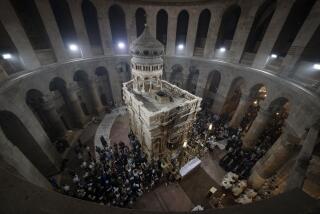Defiant S. Africa Clerics Vow to Fight On
- Share via
JOHANNESBURG, South Africa — Defying the government’s latest crackdown on the anti-apartheid movement, South African religious leaders called Sunday for an intensified struggle to end minority white rule here.
“The government of South Africa has signed its own death warrant,” the Rev. Allan Boesak, president of the World Alliance of Reformed Churches, told a large, multiracial congregation in Cape Town. “No government can challenge the living God and survive.”
With most mainstream churches now taking increasingly stronger stands against the government, the nation appears to be moving toward a sharp church-state conflict and an even deeper political crisis as a result.
“It does not matter whether they ban us, threaten us or kill us in jail,” Boesak declared. “The church of South Africa has decided that we have work to do. We must tell (President) P. W. Botha, ‘Your days are over.’ ”
Adriaan Vlok, minister of law and order, had warned that the government would “take the necessary steps” against churchmen taking up the cause of 18 opposition groups--including the United Democratic Front and the Congress of South African Trade Unions--that have been barred from further political activities.
After the 18 were barred, Anglican Archbishop Desmond M. Tutu joined with Boesak and other religious, educational, labor and civic leaders to form a new group, the Committee for the Defense of Democracy, to carry on the work of the banned organizations. But the new committee was also forbidden over the weekend to undertake “any activities whatsoever,” other than administrative, and a rally it planned was banned by police.
Police set up checkpoints on the main roads into downtown Cape Town, and special riot units, including trucks armed with a water cannon and tear gas, were positioned a block away from St. George’s Anglican Cathedral, where Sunday’s service was held. Police camera crews filmed those entering the church, and security police in plainclothes positioned themselves at the back and along the side aisles of the cathedral.
Despite the police presence, Sunday’s congregation was perhaps the largest, most militant gathering in Cape Town in many months--as if the government’s crackdown had given anti-apartheid campaigners a new issue at a moment when their fortunes were low.
“We are entering a new phase of persecution now, and there can be no turning back,” Boesak said, underscoring the churches’ determination to challenge the government. “Those of you who have decided to follow Jesus Christ must follow him now even into the streets of this country and in the face of the casspirs (armored cars), the water cannon and the tear gas.”
Boesak, Tutu and other speakers stressed the role of the church as one of the last legal channels for South Africa’s black majority to protest peacefully against apartheid, and they declared their determination to increase their challenge to the government.
“The battle is on, but Jesus Christ is Lord,” Boesak said. “You (the government) can threaten us all you like, but Jesus Christ is Lord. You can put us in jail as many times as you like--Jesus Christ is Lord. . . . You can come into the streets and into our churches and massacre us, but Jesus Christ is Lord.”
Boesak added: “I just want to say to Adriaan Vlok, Who do you think you are? Where do you get the arrogance to tell the church of God that we must toe the line? Whose line must we toe in South Africa?”
Vlok, justifying the crackdown, had argued earlier that churches were now preaching revolution instead of the true message of Christianity and, as a result, they were promoting the ideals of the outlawed African National Congress, the principal guerrilla group fighting continued minority rule in South Africa.
More to Read
Sign up for Essential California
The most important California stories and recommendations in your inbox every morning.
You may occasionally receive promotional content from the Los Angeles Times.













